Jimmy Armfield remembered: "Dad kept his World Cup winners’ medal in a Tesco bag. It was in the loft with his caps..."
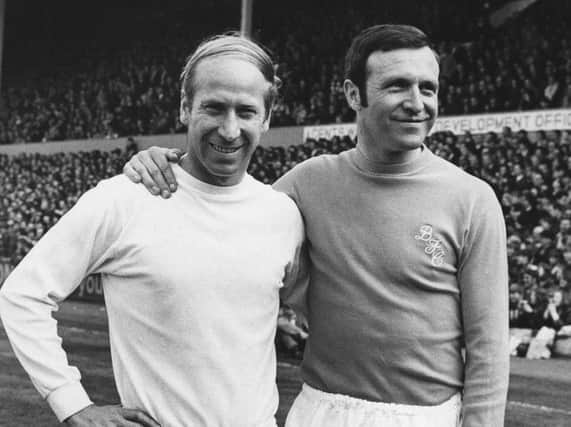

Jimmy Armfield was in the England squad that beat West Germany 4-2 after extra time, but George Cohen was preferred as right back.
In addition to an attendance of 96,924 at the stadium, the British television audience peaked at 32.3 million viewers, making it the United Kingdom’s most-watched television event ever at the time.
Advertisement
Hide AdAdvertisement
Hide AdBack home in Blackpool, two young boys watched it on TV...dosed up on medicine.
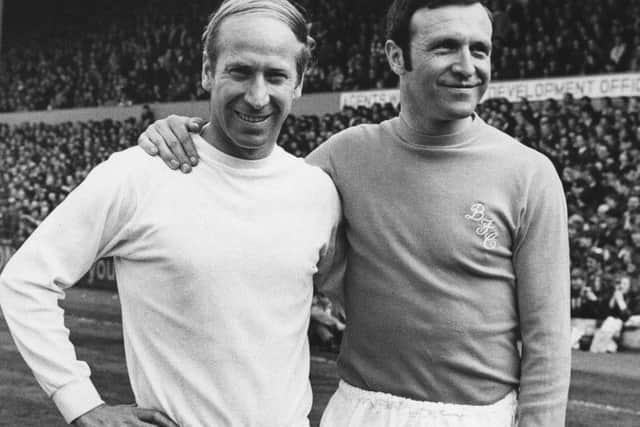

John: ‘I remember watching it because we both had German Measles at the time. Nana Ashurst would give us the medicine because my mum and dad were away in London.
‘We were getting over it but there was medicine for night called Phenergan.
‘She got it all wrong and was giving it to us in the morning so we were sleeping most of the time!
Advertisement
Hide AdAdvertisement
Hide Ad‘But I do remember watching it –we had crushed velvet red curtains in the lounge and she drew the curtains, it was supposed to be bad for your eyes if you let light in when you had German Measles.’
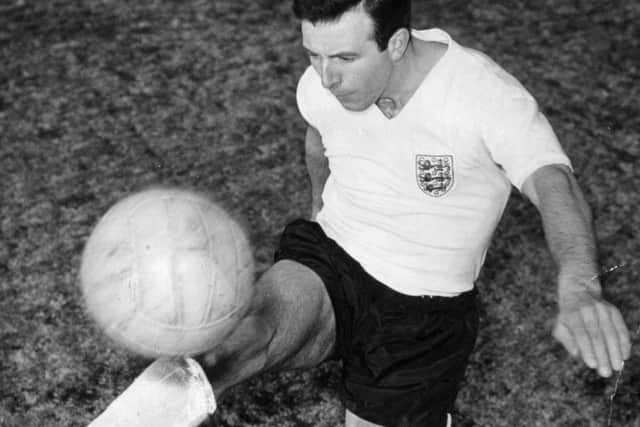

‘She put the TV on and the World Cup final was on, I was only three and Duncan was five.
Duncan: ‘I just had flashes really.
‘He was lined up to be captain during the World Cup and then during a warm up game someone stood on his toe, seven minutes before the end of the game and it broke his toe. That was in a warm up game.’
J: ‘They played three on the run and he was captain in the first two.’
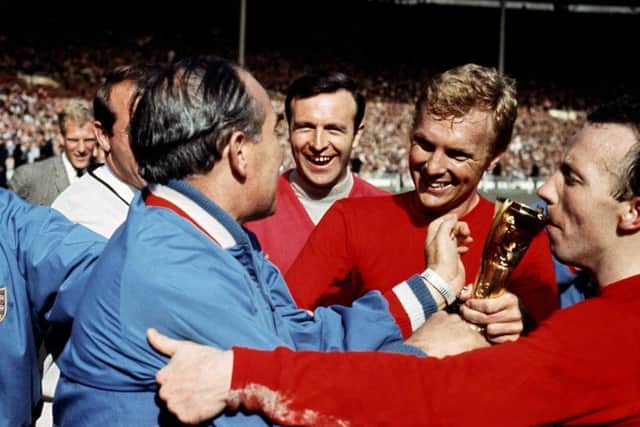

D: ‘But then George Cohen went in.’
Advertisement
Hide AdAdvertisement
Hide AdJ: ‘George already played quite a bit because dad tore his groin muscle before the South American tour in ‘64. He used to say if you win player of the year at Blackpool it was a jinx. Everyone who got it, got injured the next season.’
D: ‘I’ve spoken to him particularly during his illness and I said ‘I bet you were upset not playing and not being captain?’
‘He says, well, he would have liked that but ‘was it not more important that we won?’ And that summed Dad up absolutely because it wasn’t about him, it was about the overall impact winning the World Cup had on the English game.’
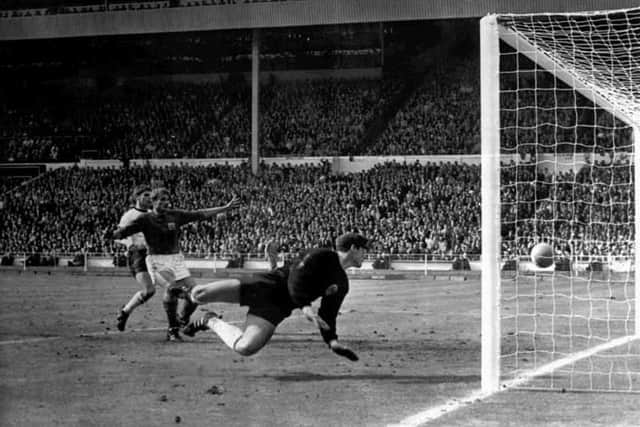

‘To be honest Dad said the ‘62 squad was as good as the ‘66 team and they had a great chance. But then they flew 28 hours to Chile, they were in an old miners camp, they played at massive altituide.
Advertisement
Hide AdAdvertisement
Hide AdJ: ‘Then they pulled them down to sea level to play the next game.’
‘He used to get a tenner for playing for England when he started.’
D: ‘That was more than your avergae Joe but it’s not like millions of pounds.’
J: ‘They got £275 each for winning the World Cup, he has a receipt...’
Advertisement
Hide AdAdvertisement
Hide AdD: ‘The FA said they would give the whole squad £2,000 and that would just be for the players who played in the team.
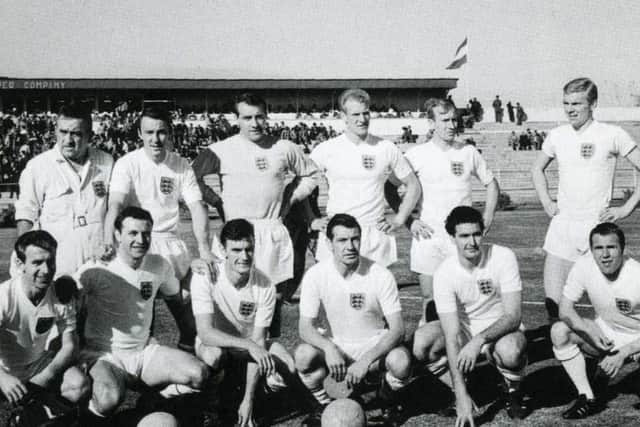

‘But Bobby Moore and my dad said no, it was for everybody. So they equally divided it between every single person in the squad.’
D: ‘One of the things that upsets me was when we were sorting his wardrobe out was to see he still had his England blazers... it’s one thing he couldn’t part with.’
Was it over the line?
In the 101st minute, Geoff Hurst controlled a cross and powered a shot towards goal. It hit the bar and crashed back down. The Russian linesman ruled it had crossed the line and the rest, they say, was history.
Advertisement
Hide AdAdvertisement
Hide AdJ: ‘Dad had Roger Hunt at Bolton and he always said he was the most honest bloke ever. He said if Roger had a chance of goal he would nip it. If you actually watch the tape, I don’t care what anyone else says, that ball hits the crossbar and comes down and Roger Hunt would have just nodded it in.
‘But as soon as it comes down he just turned and walked away. ‘If Roger Hunt was convinced then it was in. That’s what my dad said. He was only four yards from it. To watch the clip - he runs in, it hits the crossbar and it comes down and Roger just turns away with his hands up.’
D: ‘So Dad said it was a goal, that was it.’
J: ‘He said Roger Hunt was not a cheat.’
That was the convincing thing to him.’
Greatest player he ever saw
J: ‘He played with Duncan Edwards in ‘56 in an U23 match - he said it was the most complete performance he had ever seen from a player.
‘Edwards started off as inside forward, went to centre forward, halfway through the game went to centre half and he terrorised them in all three positions. ‘That’s the word he used - terrorised. I don’t mean physically but terrorised as they didn’t know what to do with him.
Advertisement
Hide AdAdvertisement
Hide Ad‘He said they could have dominated world football into the 70s had two or three of them had come through from that terrible air crash in Munich in ‘58.’
D: ‘Against Austria he said he watched Duncan Edwards run at them and they didn’t know what was going on. They just couldn’t believe it. He was so strong, they couldn’t get him off the ball, he was good in the air, he was too quick for them.
‘I think he scored three or four goals that day.’
J: He thought longevity at the top was very important. You can talk about great players but if they haven’t had longevity at the top he didn’t believe they were great players.
‘Pele had longevity, Di Stefano had longevity – Di Stefano is the greatest player he ever saw.
Advertisement
Hide AdAdvertisement
Hide Ad‘Cruyff had longevity, Maradona had longevity. But some of today’s footballers don’t have longevity. George Best didn’t have longevity, he was at the top for seven years. Dad was close to George. When he was poorly for the second time he went with Denis Law and Bobby Charlton to see George in London, they couldn’t get over it - how he deteriorated.
‘Beckham had it, Neville, Gerrard, Lampard - they had all longevity.’
D: ‘He said delivering at that very top level of the World Cup was the marker of the greats such as Bobby Charlton.’
Winner’s medal
D: ‘We have it safely stashed away. They didn’t get one originally and it wasn’t until FIFA decided everyone in each World Cup winning squad should receive a medal that Dad and the rest of the squad were presented theirs.’
Advertisement
Hide AdAdvertisement
Hide AdJ: ‘He had it in a plastic Tesco bag, we found it tucked away. Seriously. He didn’t even have it on show, it was in a plastic Tesco bag. Whenever he was asked to take it anywhere that’s what he took it in. So he didn’t take it out.’
D: ‘It was in the loft, under the eaves, with his caps.’
J: ‘He wasn’t for show wasn’t dad.’
Why was he never knighted?
It remains a mystery why Jimmy Armfield was never knighted by his country. But according to John and Duncan, it didn’t bother him one bit. In 2000 he was appointed OBE and then a CBE in 2010.
D: ‘He never said anything to me. He was thrilled when he got his OBE and CBE.
‘He was a very modest man and people always said he should have been knighted. It would have been nice and he would have loved it but it didn’t mean that much to him.’
Advertisement
Hide AdAdvertisement
Hide AdJ: ‘A lot of people try to nominate him. They try because that’s their aim. You can see players these days trying to get someone to award them something. But it’s a different generation.’
J: ‘If you see where he came from in Denton which was not the richest area. He had nothing, his parents had not a ha’penny. Where he lived during the war in Blackpool, it was a one bedroom flat, smaller than this room with his mother, sleeping top to tail for five years.
His dad was working in Manchester – he was chief air raid warden and he was as blind as a bat. It used to make my Dad laugh. He had the helmet like on Dad’s Army and he couldn’t see what was in front of him.
‘They had nothing, you see, so if you had said to him when he was 12 that you’d get an OBE and then a CBE he wouldn’t have believed you.’
D: ‘He’d have said you were living in a fantasy world.’